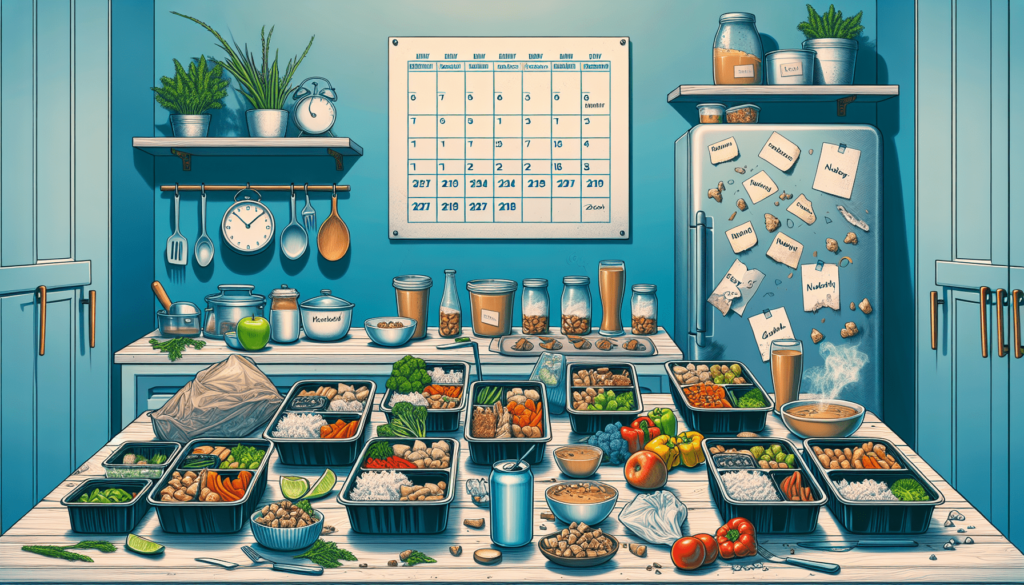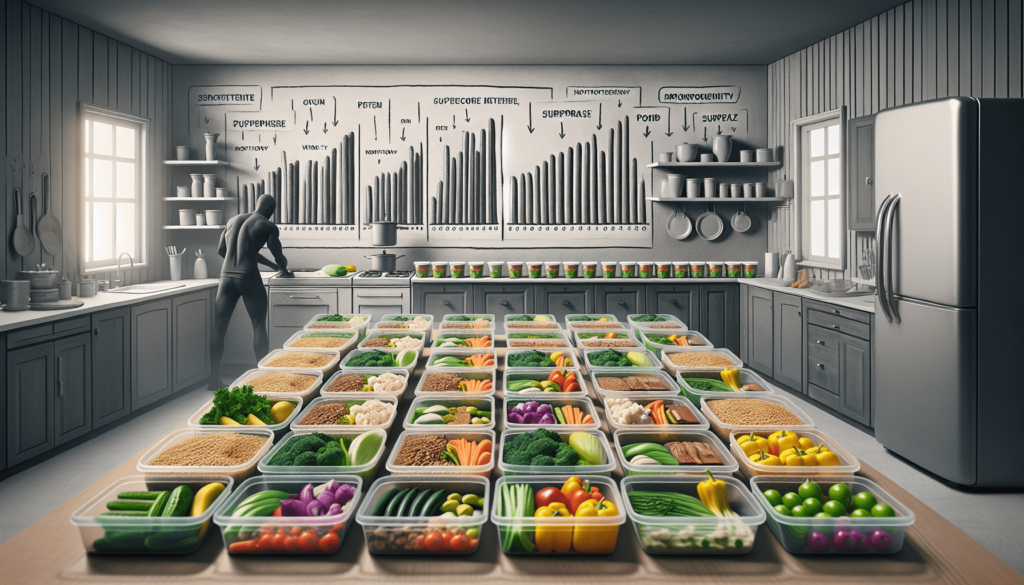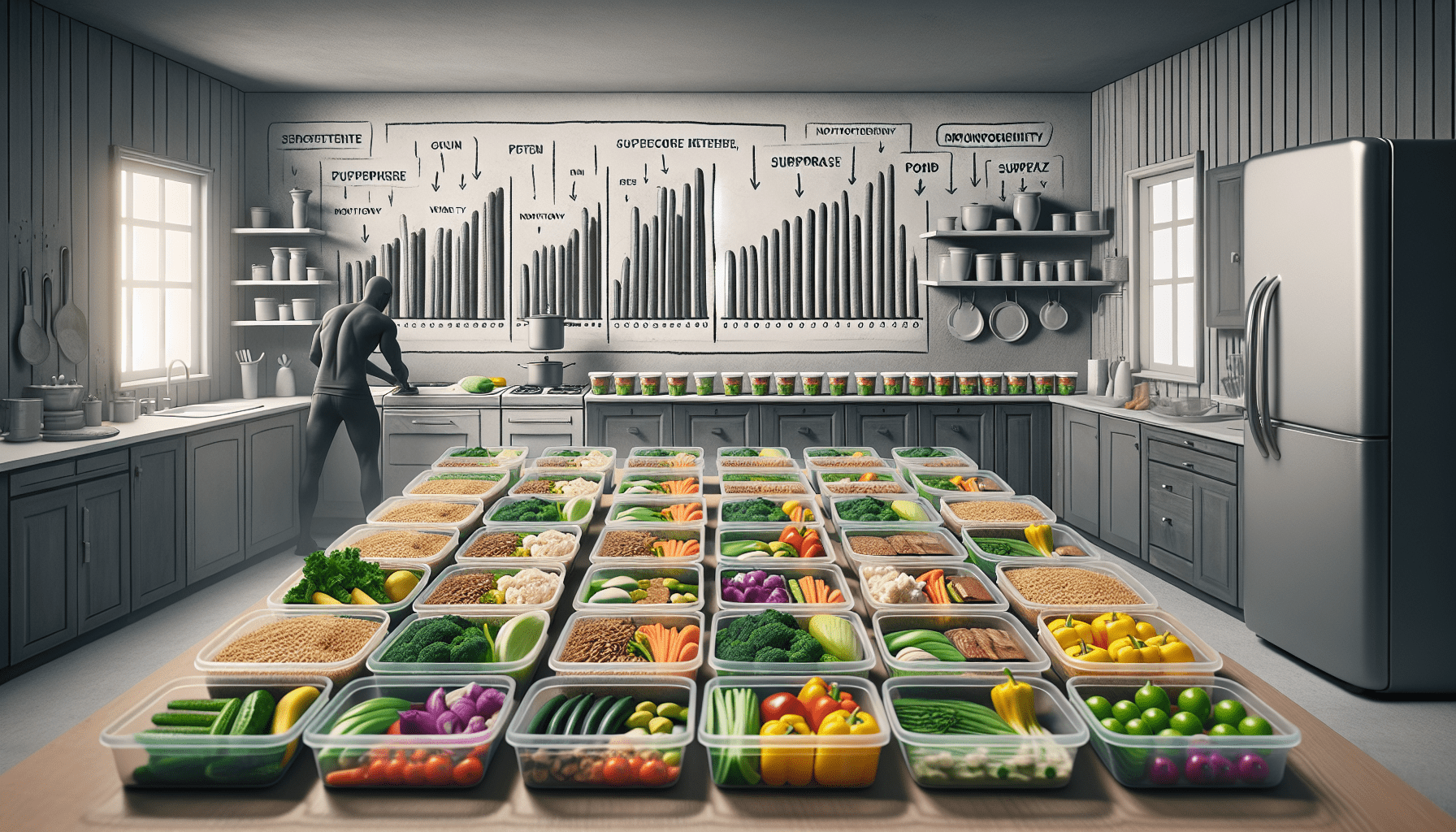So you’ve recently embarked on the journey of meal prep, hoping to save time, eat healthier, and maybe even shed a few pounds along the way. While the concept of prepping your meals in advance seems incredibly appealing, it’s important to acknowledge that, like anything else, there are also some downsides to this trend.
From potential monotony and lack of variety to the unanticipated costs and time commitment involved, it’s crucial to consider the disadvantages of meal prep before fully diving into this well-intentioned habit.

Limited Variation in Meals
Limited Choice
When you rely on meal prep, one of the main disadvantages is the limited choice it offers. You are essentially planning and preparing your meals in advance, which means you have to decide on the ingredients and recipes ahead of time. This can lead to a lack of variety in your meals since you may only be cooking a handful of dishes each week.
Repetitive Meals
With limited choice come repetitive meals. Meal prep often involves making large batches of the same meal and portioning them out for the week. While this can be convenient in terms of time and effort, it can also get monotonous quickly. Eating the same dish day after day can become boring and may lead to a lack of enjoyment in your meals.
Lack of Spontaneity
Another downside of meal preparation is the lack of spontaneity it introduces into your meals. When you pre-plan and pre-cook your meals, you remove the element of surprise and flexibility. If you suddenly feel like trying something new or dining out with friends, you may find yourself restricted by the meals you have already prepared. This can be frustrating and limit your ability to adapt to changing circumstances.
Time and Effort
Time-Consuming Preparation
Meal preparation requires a significant amount of time for planning, shopping, and cooking. You need to figure out your meals for the week, create a shopping list, go to the grocery store, and then spend hours in the kitchen preparing and cooking the meals. This can be quite time-consuming, especially if you have a busy schedule or other responsibilities to attend to.
Meal Planning Can Be Challenging
Planning your meals can also be a challenging task. You need to consider factors such as dietary restrictions, nutritional balance, and personal preferences. It can be overwhelming to come up with a variety of meals that meet all these criteria, especially if you’re not an experienced cook or have limited culinary knowledge. This can add additional stress to your already busy life.
Constant Grocery Shopping
Meal prep often requires regular trips to the grocery store to ensure you have all the necessary ingredients for your planned meals. This can become tedious and time-consuming, especially if the store is far away or if you have limited access to fresh produce. Constantly restocking your pantry and refrigerator can also increase your overall grocery expenses.
Storage and Portioning
Limited Refrigerator Space
One of the challenges of meal preparation is the limited refrigerator space it requires. When you prepare multiple meals in advance, you need to find enough room in your fridge to store them. This can be a problem, especially if you have a small refrigerator or if you live with other people who also need to store their own food. Limited space can make it difficult to keep your meals fresh and organized.
Difficulty in Maintaining Freshness
Because meal preparation involves preparing meals in advance, you may encounter difficulties in maintaining the freshness of your food. Even with proper storage, some ingredients may lose their flavor or texture over time. This can affect the overall quality of your meals and may result in disappointment when it comes time to eat them.
Portion Control Challenges
Another issue associated with meal preparation is portion control. When you pre-portion your meals, you have to estimate the right amount of food for each serving. This can be challenging, especially if you’re not familiar with portion sizes or if you tend to have variable appetites. Overeating or not having enough food can be frustrating and may negatively impact your eating habits.
Meal Quality and Taste
Potential Loss of Flavor
Meal prepping can sometimes lead to a potential loss of flavor in your meals. Certain ingredients, especially herbs and spices, may lose their potency when cooked and stored for an extended period of time. This can result in bland or dull-tasting meals, which can be disappointing and make it difficult to enjoy your food.
Texture Changes
In addition to flavor loss, meal prepping can also cause changes in the texture of your food. Ingredients such as vegetables or meat may become soggy or lose their crispness when reheated or stored for too long. This can impact the overall eating experience and may make your meals less satisfying.
Overcooked or Undercooked Ingredients
Meal prep involves cooking your meals ahead of time and reheating them when you’re ready to eat. However, this can sometimes lead to overcooked or undercooked ingredients. Not all foods reheat well, and if you’re not careful with the cooking and reheating process, certain components of your meals may become overcooked and lose their desired texture. On the other hand, some ingredients may not get fully cooked, posing a potential risk to your health.

Cost Concerns
Higher Initial Investment
Meal prep often requires a larger initial investment in terms of groceries and cooking equipment. To ensure you have enough food for the week, you may need to buy larger quantities of ingredients, which can be more expensive than buying single portions. Additionally, you may also need to invest in meal prep containers or special storage solutions, which can add to the overall cost.
Possible Food Waste
Despite your best intentions, meal preparation can sometimes result in food waste. If you’re not able to consume all the prepped meals within their shelf life, you may find yourself throwing away partially or fully prepared dishes. This not only has financial implications but is also environmentally unsustainable.
Additional Expenses for Containers
To effectively store and portion your prepped meals, you may need to purchase additional containers or storage solutions. These containers should be safe for food storage and easy to transport. While they may seem like a minor expense, the cost can add up, especially if you need to continually replace or upgrade your containers.
Long-term Commitment
Boredom and Lack of Motivation
One of the challenges of meal preparation is the potential for boredom and a lack of motivation. Eating the same meals each week can quickly become dull and uninspiring. The excitement and anticipation of trying new dishes or dining out are missing when you consistently rely on pre-prepared meals. This lack of variety can lead to a diminished enjoyment of food and a decrease in motivation to stick to your meal prepping routine.
Difficulty in Adapting to Changing Preferences
As time goes on, your eating preferences and dietary needs may change. However, meal preparation can make it difficult to adapt to these changes. If you’re already locked into a set meal plan, it can be challenging to adjust when your tastes or nutritional requirements evolve. This can lead to dissatisfaction with your meals and make it harder to maintain a healthy and balanced diet.
Inconvenience During Travel or Special Occasions
Meal preparation can be particularly inconvenient during travel or special occasions. When you’re away from your kitchen or attending events that involve shared meals, it can be challenging to stick to your pre-planned meals. This may lead to feelings of guilt or frustration, as you may feel restricted and unable to fully enjoy the experience of trying new foods or connecting with others over a meal.
Limited Restaurant and Social Experience
Less Opportunity to Explore Local Cuisine
By relying on pre-prepared meals, you may miss out on the opportunity to explore and experience local cuisine. Trying new restaurants or visiting food markets can be an exciting way to immerse yourself in different cultures and taste unique flavors. However, when you’re committed to meal prepping, you may find yourself restricted to your own prepared dishes, missing out on the chance to indulge in the richness of the local food scene.
Reduced Socializing Around Meals
Sharing meals with friends, family, or colleagues is often a social and bonding experience. However, when you’re following a meal prepping routine, you may find it challenging to participate in these social gatherings. The predetermined nature of your meals can make it difficult to join in on spontaneous meals or group outings. This may result in feelings of isolation or FOMO (fear of missing out) and can impact your overall social experiences.
Missing Out on Restaurant Experiences
When you strictly adhere to meal prepping, you may miss out on the joy of dining out and the experiences that come with it. Enjoying carefully prepared meals in a restaurant setting can provide a break from your usual routine and be a source of excitement and relaxation. By exclusively relying on your prepared meals, you may deprive yourself of these experiences and the pleasure that comes with trying new dishes or savoring the ambiance of a restaurant.
Nutritional Imbalance
Lack of Variety in Nutrients
While meal prepping can help ensure you have a consistent supply of meals, it can also lead to a lack of variety in the nutrients you consume. Depending on your meal choices and recipes, you may inadvertently limit the range of vitamins, minerals, and other essential nutrients your body needs. A monotonous diet lacking in diversity can potentially result in nutritional imbalances and deficiencies.
Possible Dietary Deficiencies
Following a meal preparation routine without careful consideration of your nutritional needs can increase the risk of dietary deficiencies. If you consistently consume the same types of meals, you may miss out on important food groups or specific nutrients, leading to imbalances in your diet. It’s important to regularly assess your meals and ensure they provide a well-rounded nutritional profile to support your overall health and well-being.
Difficulty in Adjusting Portion Sizes
Meal prep often involves portioning out meals in advance. While this can be beneficial for those seeking portion control, it can pose challenges when it comes to adjusting portion sizes. Your appetite and dietary needs may vary from day to day, and pre-set portions may not always align with your hunger levels or energy requirements. This can lead to feelings of either overeating or not being satisfied with the portion sizes, potentially disrupting your eating patterns.
Time-Sensitive Ingredients
Certain Ingredients May Not Keep Well
Some ingredients are not ideal for meal preparation due to their time-sensitive nature. For example, delicate herbs, leafy greens, or certain fruits may wilt or spoil quickly when prepared in advance. This can limit your meal options and require you to exclude these ingredients from your prepared meals, potentially reducing the variety and freshness of your dishes.
Need for Timely Consumption
Meal prep often involves cooking meals ahead of time and storing them for later consumption. However, some recipes or ingredients may not maintain their quality or taste when stored for an extended period of time. This means you need to be mindful of consuming your prepped meals within their recommended shelf life, adding an extra layer of time sensitivity to your meal planning and eating schedule.
Risk of Spoilage
Improper storage or handling of pre-prepared meals can increase the risk of spoilage. If your meals are not stored at the correct temperature or if you fail to adhere to food safety guidelines, you may expose yourself to harmful bacteria or foodborne illnesses. This risk highlights the importance of proper food handling and storage practices when meal prepping.
Dependency on Storage and Cooking Equipment
Requirement for Ample Storage Space
Meal prep often requires a significant amount of storage space, both in terms of pantry space and refrigerator real estate. To accommodate the ingredients, prepped meals, and containers, you need ample room in your kitchen. If you have limited storage space or live in a small apartment, this can present logistical challenges and may require creative solutions to maximize your available space.
Need for Proper Cooking Equipment
To successfully prep meals, you also need appropriate cooking equipment. This may include a variety of pots and pans, baking sheets, cutting boards, and utensils. If you lack these essentials, you may have to invest in them, which can add to the cost and complexity of meal preparation. Additionally, having the right equipment is crucial for ensuring food safety and achieving consistent cooking results.
Dependence on Kitchen Facilities
Meal preparation is dependent on having access to a functional and well-equipped kitchen. If you’re traveling or staying in a place without a kitchen, meal preparation may not be a feasible option. This reliance on kitchen facilities can limit your options and flexibility, particularly if you’re someone who frequently moves or enjoys exploring new places.
In conclusion, meal prepping certainly has its advantages, such as saving time and promoting healthier eating habits. However, it’s important to be aware of the potential disadvantages. Limited variation in meals, the time and effort required, the challenges of storage and portioning, concerns about meal quality and taste, cost considerations, long-term commitment, limited restaurant and social experiences, nutritional imbalances, time-sensitive ingredients, and dependency on storage and cooking equipment are all factors that need to be carefully considered. By understanding these potential drawbacks, you can make an informed decision about whether meal preparation is the right approach for you and find ways to mitigate any downsides that may arise. Ultimately, a balanced and flexible approach to meal planning and preparation can help you achieve your dietary goals while still enjoying the many pleasures of food.


